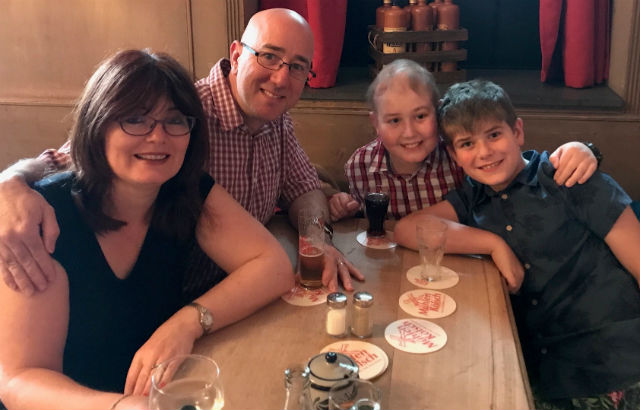Queen Mary University of London to help find a cure for brain tumours following funding from grieving family
A grieving family are marking the second anniversary of the death of their son to a brain tumour by donating a six-figure sum to Queen Mary University of London to help find a cure for the disease.

Ollie Gardiner and family
The £187,500 donation will fund a researcher over the next five years at the charity Brain Tumour Research’s dedicated centre at Queen Mary University of London.
Ollie Gardiner’s legacy will fund postdoctoral research assistant Sara Badodi. She is working with other researchers developing new treatment strategies to inhibit the progression of aggressive medulloblastoma – the type of brain tumour which killed Ollie. If successful, preclinical results derived from this project will directly inform the design of clinical trials in medulloblastoma.
Most common childhood brain cancer
Medulloblastomas are the most common brain cancers seen in young children. Treatments, which can be effective and kill the tumour cells in a proportion of patients, almost invariably also result in severe side effects which are particularly damaging in children as the brain is still growing.
Professor Silvia Marino, lead researcher at Queen Mary said: "Historically the retention of gifted scientists in the brain tumour research arena has been a challenge because of poor funding.
“This donation in memory of Ollie Gardiner provides Sara with the opportunity to continue her vital work and my team send our sincerest thanks to all of those who knew Ollie for helping us push forward in our search for a brain tumour cure.”
Jane and Peter Gardiner from Buckinghamshire lost their 13-year-old son, Ollie, on 19 November 2017, two and a half years after he was first diagnosed with a high-grade medulloblastoma brain tumour.
Queen Mary graduate Peter speaks of guilt
Peter, a graduate from Queen Mary himself, said: “We feel tremendous guilt that despite all the enormous support and fundraising from the community and all the treatments we pursued to keep him alive, we failed Ollie, but the sad fact is that much more research is needed to find a cure for this devastating disease.
“Two years after losing him, we are trying to come to terms with what has happened and continues to happen to other children and we are hoping that this donation will really help to get closer to finding a cure for the biggest cancer killer of children and adults under the age of 40.”
Under-funded research area
Chief executive of Brain Tumour Research, Sue Farrington Smith MBE, said: “The tragedy of Ollie’s story reminds us that brain tumours are indiscriminate; they can affect anyone at any age. What’s more, less than 20 per cent of those diagnosed with a brain tumour survive beyond five years compared with an average of 50 per cent across all cancers, and we cannot allow this desperate situation to continue.
“Losing a child to a brain tumour is devastating; you never get over it. I know a little of what the family are going through, having lost my sister’s little girl Alison Phelan to a brain tumour just three weeks before her eighth birthday. As a family we were shocked at the lack of awareness and horrified to discover how little research was going into brain tumours and were determined to change this.
“Brain Tumour Research is indebted to the Gardiner family for their incredible support in funding the fight against brain tumours. Together we will make Ollie’s light shine even brighter.”
To donate, go to www.braintumourresearch.org/donation and indicate your donation is to Ollie’s Fund.
Related items
For media information, contact:
Chris MahonyFaculty Communications Manager (Medicine and Dentistry)
email: c.mahony@qmul.ac.uk


